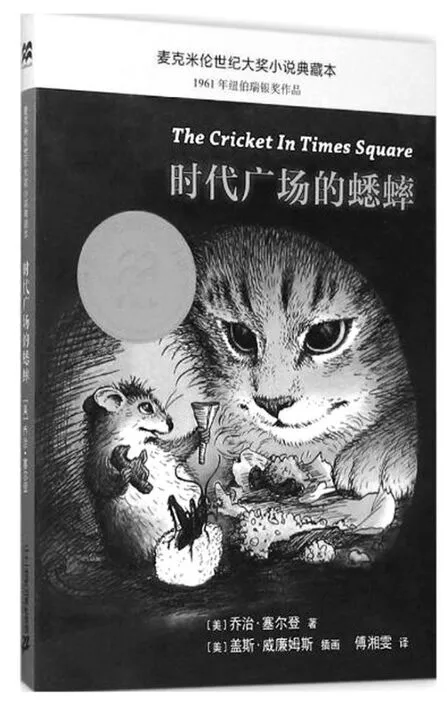友情的力量
———《时代广场的蟋蟀》赏析
文 /晓 菲
◆原作节选◆
Chapter Eight Tucker’s Life’s Savings
Chester Cricket was having a dream.In his dream he was sitting on top of his stump back in Connecticut(康涅狄格州),eating a leaf from the willow tree.He would bite off a piece of leaf,chew it up,and swallow it,but for some reason it didn’t taste as good as usual.There was something dry and papery aboutit,and ithad bitterflavor.Still,Chester kept eating,hoping that it would begin to taste better.
A storm came up in his dream.The wind blew clouds of dust across the meadow.They swirled around his stump,and Chester began to sneeze because the dust got in his nose.But he still held on to the leaf.And then he sneezed such a big sneeze that it woke him up.
Chesterlooked around him.He had been walking in his sleep and he was sitting on the edge of the cash register.The storm had been a gust of air that blew into the newsstand when the shuttle pulled up to the station.He was still choking from the dirt that flew around him.Chester looked down at his two front legs,half expecting to find the willow leaf.But it was no leaf he was holding.It was a two-dollar bill and he had already eaten half of it.
第八章 塔克一生的积蓄
蟋蟀切斯特正在做梦。在梦里,他坐在康涅狄格州老家的一个树墩上,正在吃柳树上掉下来的一片叶子。他咬一口叶子,细细嚼碎,再吞下去,可是那味道不知道为什么不像平常那么好,干巴巴的,像纸一样,还有苦味。不过,切斯特还是继续吃下去,希望味道会开始好起来。
梦中出现了风暴。大风卷起灰尘,掠过草地,围着树墩盘旋。灰尘吹进切斯特的鼻孔,他开始打喷嚏,但他仍然抱住那片叶子。接着,他打了一个巨大的喷嚏,把自己惊醒了。
切斯特环顾四周,原来自己做梦的时候一直在走动,现在正坐在现金出纳机边上。梦中的风暴实际上是区间火车到站掀起的一股气浪吹进了报摊。四周掀起的灰尘仍然呛得他透不过气来。切斯特低头看看自己的两条前腿,满怀几分希望地去找到梦中的那片柳叶。可是他抱住的并不是柳叶。那是一张两元美金的钞票,这张钞票已经被他吃掉了一半。
切斯特放下钞票,向蟋蟀笼跳过去。老鼠塔克在笼子里睡得正香。切斯特猛烈地摇动着银铃。铃子叮当叮当响起来,就像发生了火警。塔克在钞票毯子下翻身跳起,在笼子里跑来跑去,一边大声喊叫:“救命啊!失火了!出了人命案!警察快来啊!”
He dropped the bill and leaped over to the cricketcage,where Tucker Mouse was sleeping peacefully.Chester shook the silver bell furiously;it rang likea fire alarm.Tuckerjumped outfrom under his blanket of dollar bills and ran around the cage shouting,“Help!Fire!Murder!Police!”
Then he realized where he was and sat down panting. “What is the matter with you,Chester?”he said.“I could have died from fright.”
“Ijustate halfofa two-dollarbill,” said Chester.
Tucker stared at him with disbelief.“You did what?”he asked.
“Yes,”said Chester, “look.”He fetched the ruined two-dollarbillfrom the cash register.“I dreamed it was a leaf and I ate it.”
“Oh oh oh oh,” moaned Tucker Mouse.“Not a one-dollar bill—not even a one-dollar bill and a fifty-cent piece—two dollars you had to eat!And from the Bellin is too—people who hardly make two dollars in two days.”
“What am I going to do?”asked Chester.
“Pack your bags and go to California,”said Tucker.
Chester shook his head. “I can’t,” he said.“They’ve been so good to me—I can’t run away.”
Tucker Mouse shrugged his shoulders.“then stay and take the rap,”he said.He crept out of the cage and examined the remains of the money.“There’s still half of it left.Maybe we could put Scotch Tape along the edge and pass it off as a one-dollar bill.”
“No one would believe it,”said Chester.He satdown,stillforlornly holding the bill.“Oh,dear—and things were going along so nicely.”
Tucker Mouse put his bedclothes back in the cash register drawer and came to sit beside Chester.“Buck up,” he said. “We could still figure something out,maybe.”
后来,老鼠塔克才弄清楚自己是在什么地方,喘着气坐下来。“切斯特,你搞什么名堂?”他说,“我差一点吓死了。”
“我刚才把一张两美元的钞票吃掉了半边。”切斯特说。
塔克露出不相信的神情,目不转睛地望着切斯特,问他:“你吃了钞票?”
“是的,”切斯特说,“看吧!”他从现金出纳机里拿出那张吃坏了的钞票。“我梦见这是一片树叶,我以为自己吃的是树叶哩。”
“唉,唉,唉,”老鼠塔克悲叹着说,“这可不是一元美金的钞票,甚至也不是一美元钞票再加上五角硬币,你吃的是两美元啊!何况又是贝利尼一家人的两美元啊!他们这一家,唉,两天还赚不到两美元啦。”
“我该怎么办呢?”切斯特问道。
“收拾好行李,回康涅狄格州去。”塔克说。
切斯特摇摇头。“不行,”他说,“他们对我这样好,我不能跑掉。”
老鼠塔克耸耸肩膀。“那么,你就留下来承担责任吧。”他说。他从蟋蟀笼里爬出来,仔细检查了那张吃掉半边的钞票:“这张钞票还留下了半边,我们也许可以沿着这边补上纸条,把它当一美元用出去。”
“谁也不会相信的,”切斯特仍然悲伤失望地捏着那张残破的钞票,坐下来说,“哎呀,情况本来一直都很顺利啊。”
老鼠塔克把他用来做被单、毯子的钞票放回现金出纳机的抽屉里,走过来坐在切斯特旁边。“别泄气,”他说,“我们还可以想办法,可能有办法的。”
They both concentrated for a minute.Then Tucker clasped his paws and squeaked,“I got it!Eatthe restofitand they’llneverknow what happened.”
“They’d accuse each other of losing it,” said Chester. “I don’t want to make any bad feeling between them.”
“Oh,you’re so honorable!” said Tucker.“It’s disgusting.”
“Besides,it tastes bad,”added Chester.
“Then how aboutthis.” Tuckerhad anew idea.“We frame the janitor who cleans the station.I’lltake the evidence overand plantitin his watercloset.Hewhopped mewith amop last week.I would be glad to see him go to jail for a few days.”
“No, no,” said Chester. “We can’t get somebody else in trouble.”
“Then a stranger,”said Tucker.“We tip over the Kleenex,break the glass in the alarm clock,and throw allthesmallchange on thefloor.They’ll think a thief came in the night.You could even put a bandage on and make out like a hero.I could see it all—”
“No!”Chester interrupted him.“The damage we’d do would costeven more than the two dollars.”
他们全神贯注地想了一分钟,塔克忽然拍着他的爪子,尖声叫喊着:“我想到了一个好办法!干脆吃掉剩下的半边钞票,他们就再也不会知道这件事啦。”
“失掉了这张钞票,他们会互相争吵不休的,”切斯特说,“我不愿意使他们之间产生任何厌恶感。”
“哦,你多么诚实啊!”塔克说,“这钞票真讨厌。”
“再说,它的味道也不好呢。”切斯特补上这么一句。
“那么,这个办法好不好,”塔克又有个新主意,“让我们去诬陷那个在车站打扫的看门人吧。我把这张钞票作物证,拿去放在他的盥洗室里。上个星期,他用拖把打我。看到他去蹲几天监狱,我才开心呢。”
“不行,不行,”切斯特说,“我们不能使别人受连累。”
“那么,就把过错推到谁也不认识的陌生人身上去吧,”塔克说,“我们把装纸手绢的盒子打翻,把闹钟上的玻璃打破,把零钱丢到地板上。他们会以为夜里来过小偷。你甚至还可以用绷带把自己包扎起来,装成一个英雄的样子。那情景,我简直就像已经看到了——”
“不行!”切斯特打断了他的话,“我们造成的损失甚至还会超过两元美金。”
1.stump n.树桩 2.willow n.柳树 3.swallow v.吞
4.papery adj.纸一样的 5.meadow n.草地 6.swirl around v.旋转
7.sneeze v.打喷嚏 8.gust n.一阵狂风 9.newsstand n.报摊
10.shuttle n.穿梭火车 11.choke v.(使)窒息 12.leap over跳过
13.furiously adv.狂怒地 14.pant v.喘气 15.moan v.悲叹
16.shrug v.耸肩 17.take the rap承担责任 18.creep out v.爬出
19.forlornly adv.绝望地 20.squeak v.尖叫 21.accuse v.指责
22.janitor n.看门人 23.whop v.抽打 24.jail n.监狱
◆赏析◆
如果你远离宁静的家乡,去到最繁华的城市生活,在午夜梦回想家的时候,你会以怎样的方式来缅怀故土?作者乔治·塞尔登先生(George Selden,1929—1989)则用别具匠心的方式,为他的家乡康涅狄克州撰写了一部流传至今的小说——《时代广场的蟋蟀》(Crickets In Times Square)。它勾起了读者们对这片土地的好奇心。

小说的主人公小蟋蟀切斯特因为贪吃,误打误撞踏上了从康涅狄克州去纽约的火车。这只可怜的小蟋蟀见惯了家乡的草地、微风、还有漫天的柳树,刚到这处处被霓虹灯照耀的城市时,茫然不知所措。站在时代广场的中间,切斯特只能抬头看着头顶上似曾相识的那颗星星,才勉强能够入眠。不过,切斯特也算得上所有蟋蟀里最幸运的一只了。因为在脚步匆忙的城市里,他居然结识了一群让他受益终身的伙伴们。小主人马里奥就不用说了,作为切斯特的救命恩人,尽管自己也生活窘迫,但许多次都仗义地为切斯特挺身而出。从无到有,从陌生到熟悉,从角落里最不起眼的小蟋蟀到时代广场备受瞩目的演奏家,马里奥可谓切斯特生命里不可或缺的一名“贵人”。小老鼠塔克和猫咪亨利的功劳也不小,它们捐出一生的积蓄,换来了切斯特的自由,还在每一次困境出现时,为小伙伴扫除障碍,一步步帮助他成为纽约最负盛名的演奏家。
本期节选的就是“糊涂蛋”切斯特因为太过思念家乡,在梦里把马里奥家的两美元当做家乡的树叶给吃掉了的故事。这件事情非同寻常,两美元对马里奥一家来说,可是好多天的生活费呢。作者乔治用极其夸张的语气将切斯特的痛苦与懊悔,小老鼠的圆滑与小聪明,描写得淋漓尽致,让读者恨不得赶紧掏出两美元,跳进故事情节里,帮助大家度过这个悲伤的夜晚。短短的数十句对话,已经让读者的心情紧紧地和主人公绑在了一起。
在好朋友的帮助下,小蟋蟀切斯特度过了难关,并逐步走上了成功的演奏之路。原来,时代广场的脚步,并不永远都是匆匆忙忙的。城市上空的霓虹也会有凝固的一刻,马路上飞驰的车辆也会驻足欣赏,大家都被切斯特悦耳的歌声打动了。小蟋蟀终于成功了,再也不用担心在这个城市里无法适应。不过,纽约上空的灯光再绚烂,伙伴们的陪伴再温情,依旧抵不过夜夜在梦境里困扰自己的那片故土。虽然只是田野、轻烟、绿草遍地,却是自己内心无法替代的最美风景。最后,切斯特毅然决定舍弃名利,回到故乡康涅狄克州,做回草地上那只默默无闻却无忧无虑的小蟋蟀。而他那帮铁兄弟们,自然也是毫无条件地支持他了。正可谓真挚的友情,定是因为理解还有包容,才能走得更长远的。
或许是因为作者乔治将对故乡的所有柔情以及内心深处仰慕小蟋蟀的勇气,都汇聚在文字里,所以这本书使他一举成名,并于1961年获得纽伯瑞儿童文学奖银奖。

